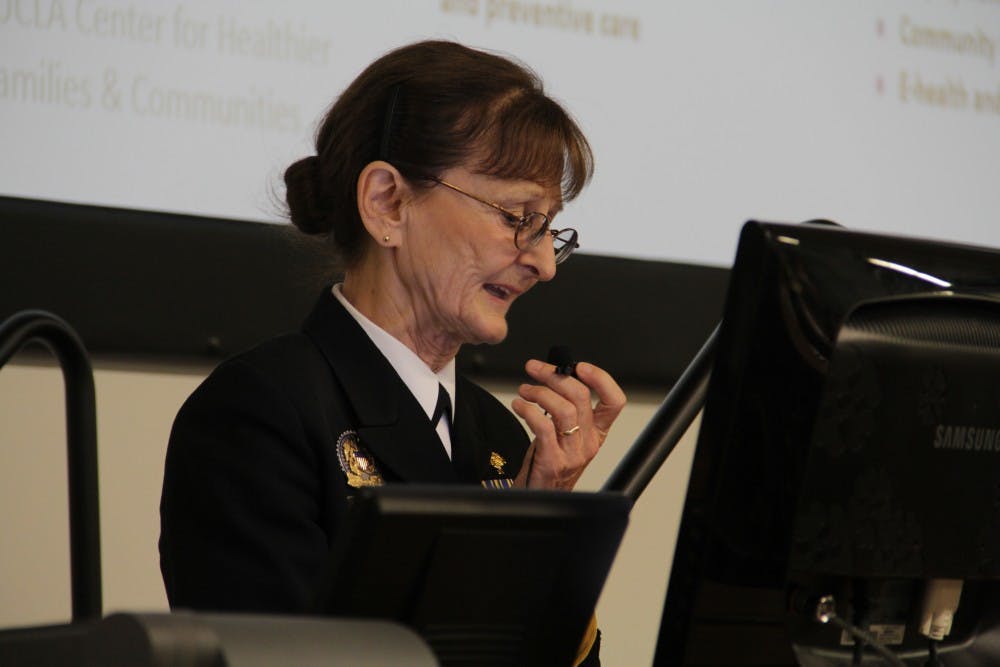 Speaking to an audience of nursing students and faculty at the College of Nursing and Health Innovation building on the Downtown campus, Assistant Surgeon General Nadine Simons talks about how the Patient Protection and Affordable Health Care Act will affect students and the health care industry. (Photo by Shawn Raymundo)
Speaking to an audience of nursing students and faculty at the College of Nursing and Health Innovation building on the Downtown campus, Assistant Surgeon General Nadine Simons talks about how the Patient Protection and Affordable Health Care Act will affect students and the health care industry. (Photo by Shawn Raymundo)Corrections added.
With the Affordable Care Act, also known as Obamacare, being phased in, ASU students will be required to have health insurance or face fines, government representatives said.
Implemented on Oct. 1, the new health care plan looks to create a more affordable system with better quality and education.
History senior Patrick Seifter, who was the president of the 2012 student organization Students For Obama, said the Affordable Care Act is a step in the right direction to reform health care.
"This law is designed ... for insuring those that cannot otherwise do so," he said in an email.
Seifter said that once students are off their parents’ health insurance plans, the mandate of coverage will help them.
“The typical student generally won't think about health insurance until they need it in an emergency,” Seifter said. “The mandate essentially makes sure they'll have it when they need it.”
A health care model known as the Health Literacy Universal Precautions Toolkit has been called for by the Agency for Healthcare Research and Quality, ensuring that first-time buyers will be better equipped to learn about and choose a health plan.
Rear Admiral Nadine Simons, regional health administrator for the government, spoke to nursing students at ASU about the ACA on Sept. 26. and said the University is full of first-time health care customers.
“The Affordable Care Act … represents a new opportunity for millions of community members who don’t have health care coverage,” she said.
Another way to become better educated is to use the Health Insurance Marketplace online.
“If (students) want to explore the marketplace,” Simons said, "they’ll be able to access an essential package of services.”
These packages include 10 services in each plan, including preventive services, prescription drugs and mental health services. Students do not have to search through these plans, though, if they are not planning to purchase insurance.
In addition to more coverage, Simons said the new law will offer preventative services.
“It’s really going to … (help) people with a health problem discover it sooner rather than later, so it’s not more of a problem,” Simons said.
Criminal justice graduate student Heather Christ, the former president of the College Republicans at ASU on the West campus, said in an email that students may choose the option to not consider one of the new plans.
“If their parents have health care, then they will still be eligible to be under their parents’ health care until they complete school,” she said.
Secondary education and political science junior Corey Helsel, the president of the College Republicans at ASU on the Tempe campus, said in an email that he was concerned. He said the bill is discouraging businesses from expanding and hiring more employees.
“This should be very disconcerting for students who are about to graduate and enter the workforce,” he said.
Seifter said there would be more profound factors in play in terms of a job search, such as field of study and job market.
Political science sophomore William McDonald, who co-founded the Youth in Government club at ASU, said in an email that he understood the concerns toward ASU students who are about to graduate and enter the job market, though he said that it is a controversial aspect.
McDonald also said the insurance plan might not affect students just yet, though.
“ASU students who are insured under their parents' health care benefits from employment will not be impacted in that respect,” McDonald said. “The same goes for ASU faculty who receive employee health benefits from the University.”
McDonald also said that coverage will increase for some students.
“Students with pre-existing medical conditions … will no longer be denied coverage on that basis,” he said.
Since the law has not been fully put into place, McDonald said they will have to wait to fully see its effects.
“We'll have to wait to get a full picture of the law's enactment and the subsequent ramifications for the American health care system,” McDonald said.
Reach the reporter at lmnewma1@asu.edu or on twitter @Logan_Newsman
Correction: An earlier version of this article misstated the relationship between the Affordable Care Act and the Health Literacy Universal Precautions Toolkit.




